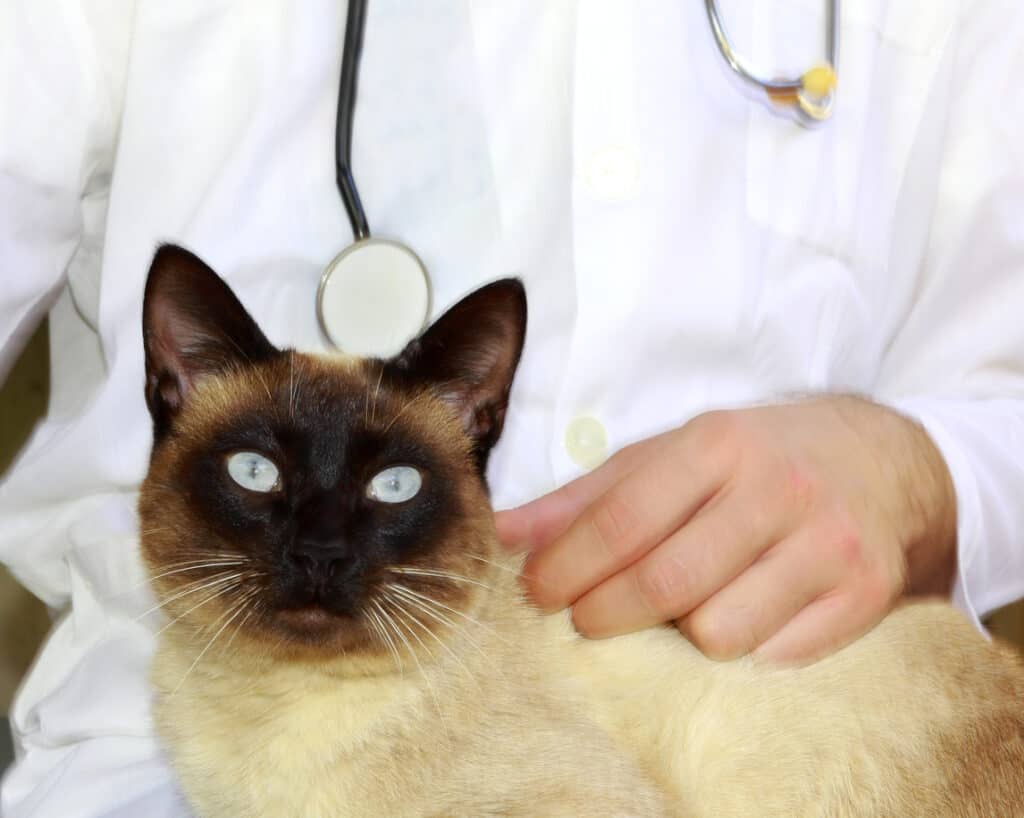Siamese cats are one of the most unique breeds of cats out there with their striking blue eyes, distinctive coat, and chatty nature.
It stands to reason that we want to keep these lovable felines around as long as possible.
They bring so much happiness and joy to our lives that we want to help them reach old age and thrive.
So how long do Siamese cats live and how can owners increase their lifespan?
Siamese cats live anywhere from 12-20 years depending on their living conditions. Factors that improve their chances of living to old age are keeping them indoors, feeding them a healthy diet, and taking them for regular vet trips.
Siamese cats have a lot going for them, and if you love the companionship they bring, then you’ll want to keep them around as long as possible.
The rest of this article will explore how long Siamese cats live and how to increase their lifespan.
How long do Siamese cats live?
Siamese cats are bred to be pretty hardy cats in the long run, and they have a longer life expectancy than a lot of other breeds.
Barring any underlying health conditions or diseases, there’s no reason why a Siamese cat can’t at least live past 12 years of age.
There are plenty of pet owners out there with 20-year-old Siamese cats who are still going strong.
In fact, for a time, the world’s oldest cat was a Siamese named Scooter, a titan among Siamese cats, who lived to the ripe old age of 30!
As long as you take good care of your Siamese and keep them away from danger where possible, you can expect your cat to live a long, happy life.
Want to know the life expectancy of your cat? Have a look at our Cat Age Chart.
How to let your Siamese live longer
The first thing you can do to extend the lifespan of your Siamese cat is to keep them indoors.
Since the breed is predisposed to a whole host of illnesses, letting your Siamese―or any cat for that matter―live outside will shorten their lifespan.
Not only do they run the risk of apparent dangers like cars and predators living on the streets, but they also are more prone to disease, illnesses, and infections outside.
At nighttime especially, Siamese cats are more vulnerable to being hit by cars or attacked by other cats and predators. Siamese cats, due to the breeding process, don’t have the second layer of their eye that allows for greater night vision.
As such, Siamese are extremely susceptible to injury if left outside at night. An indoor environment is safer, more stable, and perfectly suited for your Siamese cat’s active needs when properly established.
Dietary tips for Siamese cats
Another great way to keep your cat happy and healthy, as well as warding off disease is to feed them right.
Siamese, like other cats, benefit most from a diet consisting of a combination of dry food, wet food, and fresh food.
Food shouldn’t be calorie-heavy and should be easily digestible, consisting of 25-30% protein, 5-10% carbs, and 15-25% fat in wet cat food.
Water is also crucial to a cat’s health, so make sure they have constant access to clean water at all times of the day.
Medical considerations for Siamese cats
Siamese cats are predisposed to a lot of health conditions, so it’s important to take them for regular checkups.
By doing so, your veterinarian can pick up on any issues before they take root and hopefully address them quickly.
Siamese cats are prone to asthma, certain cancers, progressive retinal atrophy, hip dysplasia, gum disease, and lysosomal storage diseases.
They are also more sensitive to anesthesia, making surgery more dangerous for them. In general, if you see any of the following warning signs, you should take your Siamese for a checkup:
- Lethargy
- Prolonged lack of appetite
- Unexpected diarrhea
- Vomiting
- Seizures
- Droopy eyelids
- Tilting of the head
- Rapid eye movements

Any of these symptoms can be a reason for concern of future health risks and should be cause for a trip to the vet.
Make sure that your cat has a happy and safe home environment too, establishing a routine with your cat and engaging in active play.
Stress plays a role in the onset of many bodily ailments, so make sure you’re giving your Siamese plenty of time and love.
What to expect at different ages
Just like humans, cats change as they grow older. Your Siamese may be less active and perhaps even more affectionate. Here’s what to expect during their different life stages.
Kitten (0-6 months)
Your kitten will be rambunctious, full of energy, and have an insatiable need to be with you. During this time, be sure to take your feline friend for their shots within the timeframe recommended by the breeder.
Not doing so opens up your cats to a bunch of unnecessary risks.
Troublemaker (6 months – 2 years)
This is the phase where your kitten will start adapting to the home environment, establishing a routine, and learning how to be an adult.
During this time, their darker colors will begin to develop on their face, feet, and bodies. Expect a lot of mischief from your young troublemaker. They are very agile and need a lot of attention and play to burn off their energy in a healthy way.
Adult cat (2-10 years)
During this time, your Siamese will become your best friend, fully confident in you as an owner. Their personality will develop, and they will settle into routine behavior.
Aging cat (10-15 years)
During this time, your Siamese cat will be susceptible to more diseases and will tend to slow down, taking more naps and engaging in less playtime. They may be less receptive to new environments as well.
Senior cat (15+ years)
In the twilight years of their lives, Siamese cats will spend most of their time napping and will be less situationally aware. They may vocalize less than in their youth, but at this point, you should make sure they’re comfortable and happy.
Our final thoughts
Siamese cats have a long history of bringing people joy with their antics and companionship, so it stands to reason that people want them to be around as long as possible.
Siamese cats can live anywhere from 12-20 years on average, and with a good diet, proper care, and a safe environment, you can hopefully increase the lifespan of your Siamese cat.
Love reading about Siamese cats?
Have a look at our other articles about this amazing breed
Our most popular article:
Introduction to Siamese Cats
Everything you need to know.
Or have a look at these popular reads from our website…
-

Why Do Siamese Cats Always Have Blue Eyes?
If you’ve ever looked up from work to see your cat staring at you, then the first thing you probably […]
-

Why Does Your Siamese Cat Bite So Much?
Siamese cats are a popular breed for their distinct beauty and character, so you might be surprised to find out […]
-

Wedgehead Siamese Cats Versus Traditional Siamese Cats
Siamese cat breeds are consistently ranked in the top 2 or 3 of the most sought-after cats in the world […]
References
https://faqcats.com/siamese-cat-growth-timeline/
https://icatcare.org/advice/siamese/
https://www.hepper.com/how-long-do-siamese-cats-live/




